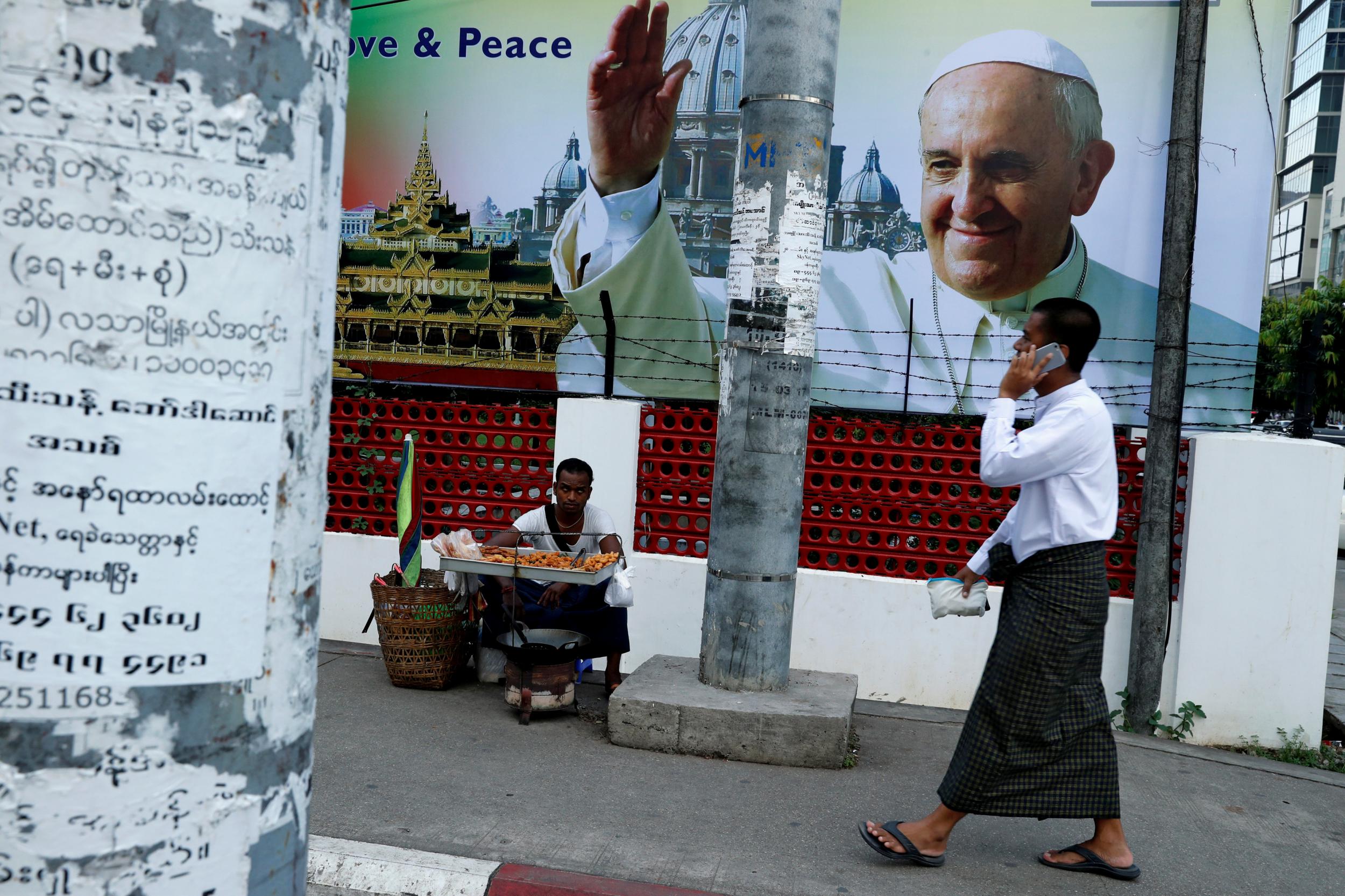Pope Francis urged to speak out for Rohingya Muslims during Burma visit
'He should express the outrage of the international community and all people of faith about this brutal ethnic cleansing campaign'

Your support helps us to tell the story
This election is still a dead heat, according to most polls. In a fight with such wafer-thin margins, we need reporters on the ground talking to the people Trump and Harris are courting. Your support allows us to keep sending journalists to the story.
The Independent is trusted by 27 million Americans from across the entire political spectrum every month. Unlike many other quality news outlets, we choose not to lock you out of our reporting and analysis with paywalls. But quality journalism must still be paid for.
Help us keep bring these critical stories to light. Your support makes all the difference.
Activists were calling on Pope Francis to speak out for the Rohingya Muslims in Rakhine state as he arrived in Burma on Monday, as part of a state visit to that country and Bangladesh which was organised before the latest violence began.
Human Rights Watch told The Independent the pontiff must "express the outrage of the international community" during his stay in the capital Yangon.
But other advisers, including a Burmese Catholic cardinal and former UN chief Kofi Annan, warned Pope Francis against even using the word "Rohingya" in the presence of his hosts.
The Burmese government refers to the Rohingya Muslims in Rakhine, hundreds of thousands of whom have fled the country citing a campaign of persecution, as "Bengalis" - painting them as illegal immigrants.
Rohingya is "a very contested term, and the military and government and the public would not like him to express it,” Burmese Cardinal Charles Maung Bo said earlier this month, following a meeting with Pope Francis.
Catholics inside the country have also expressed concern about a backlash. “Like other people, I’m afraid of what he will say about Rakhine state,” a priest called Father Paul said. “I don’t think he will say anything.”
Mr Annan, who headed a commission of inquiry into the Rakhine persecutions, said using the term could be “incendiary”.
“The word is so emotional,” he said.
However, Pope Francis has already used the word: in one of his weekly addresses in February, the pontiff said he wanted people to pray “particularly for our Rohingya brothers and sisters”.
“They have been thrown out of Burma, moved from one place to another because no one wants them. But they are good people, peaceful people,” he said. “They are our brothers and sisters. For years they have suffered, they have been tortured and killed simply because they practice their own traditions, their own Muslim faith.”
Last week, Vatican spokesman Greg Burke refused to confirm whether Pope Francis would utter “Rohingya” during his trip, adding that it’s “not a prohibited word”.
“Let’s just say it’s very interesting diplomatically,” he told reporters.
The UN dubbed the Rohingya “the most oppressed people on Earth” even before the latest military offensive began in August. More than 600,000 have fled to refugee camps in Bangladesh over the past three months.
Last week, the US labelled the ongoing violence against the Rohingya “ethnic cleansing”.
Considering the scale of the violence and displacement faced by the minority group, Phil Robertson, deputy Asia director for Human Rights Watch, told The Independent he believes the pontiff should make a point of using the word Rohingya.
“[He] should express the outrage of the international community and all people of faith about the brutal ethnic cleansing campaign against the Muslim Rohingya of Rakhine state, and make a point of using the word Rohingya to maintain faith with those long-suffering people who the Burmese government refuses to allow citizenship or the right of self-identification.”
Mr Robertson also called for the pontiff to speak out against Burmese laws which allow discrimination towards Christians.
“[He should] press the government to repeal the four so-called ‘race and religion’ laws that enshrine discrimination on the basis of religion in marriage and family matters, and mandates intrusive government oversight of persons seeking to convert to another religion.”
Just over one per cent of Burma’s 53 million people are Catholic. Though they are not persecuted like the Rohingya Muslims, Christians still face discrimination in mostly Buddhist Burma.
“To be honest, if you are a Christian in this country, you will never get promoted,” Reverend Mariano Soe Naing, a spokesman for Burma’s Bishops’ Conference, told the Associated Press.
“There are no Catholics in the government administration or in any significant leadership positions.”
While in Burma, Pope Francis is scheduled to hold a mass in a stadium in Yangon, spend time with Buddhist leaders and meet Burma’s de facto leader Aung San Suu Kyi and president Htin Kyaw.
The pontiff will also be introduced to Min Aung Hlaing, Myanmar’s commander-in-chief and the man responsible for the military operation in Rakhine state.
Pope Francis is then expected to go to Bangladesh and spend time in the refugee camps along the Burmese border.
Subscribe to Independent Premium to bookmark this article
Want to bookmark your favourite articles and stories to read or reference later? Start your Independent Premium subscription today.
Join our commenting forum
Join thought-provoking conversations, follow other Independent readers and see their replies
Comments